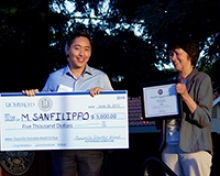Chancellor’s Innovation Awards Program Kicks Off
 The 2016 Chancellor’s Innovation Awards program launches on May 13, and staff members are encouraged to submit team proposals that improve UC Merced’s work environment.
The 2016 Chancellor’s Innovation Awards program launches on May 13, and staff members are encouraged to submit team proposals that improve UC Merced’s work environment.
The program, which Chancellor Dorothy Leland debuted in 2015, rewards proposals that improve processes, customer service, organizational structures or work environments or staff engagement.
Staff members will receive an email from the Office of the Chancellor announcing the call for proposals. The letter will include a link to the Chancellor’s Innovation Awards webpage, where staff members can find details on how to submit ideas, the submission criteria, the selection process, deadlines and more. The deadline to submit proposals is June 1.
In addition to earning kudos, the top proposals will be awarded prize money:
- First place, $5,000;
- Second place, $2,500;
- Third place, $1,000; and
- Five honorable mention awards, each worth $500.
Finalists will be invited to a reception at University House to discuss their innovations, and Leland will announce the winners during Staff Convocation, scheduled for mid-August.
Update on 2015 Innovation Awards
Meanwhile, progress continues on the 2015 winning proposals. Last year’s judges described them as an eclectic group that underscored the scope of creativity and imagination of UC Merced staff members.
An implementation committee that included representatives from the Budget Office, Information Technology, the Division of Business and Administrative Services and University Communications discussed each of the winning proposals with submitters and the departments affected by or involved with the ideas. The conversations helped identify implementation timelines, potential risks and viabilities.
Here’s a brief update on where each of the proposals currently stand:
- CatVax, a mobile Web application to streamline vaccination assessment, won first place for Michael Sanfilippo of Student Health Services. After further study, the recommendation was to
 promote this project on a systemwide level. Using a joint approach, all campuses would share the benefits of the program as well as its costs, estimated at $1.4 million. The end product could be marketed to other universities and health agencies, creating a potential revenue source for the University of California.
promote this project on a systemwide level. Using a joint approach, all campuses would share the benefits of the program as well as its costs, estimated at $1.4 million. The end product could be marketed to other universities and health agencies, creating a potential revenue source for the University of California.
- Where’s the Bus, designed to provide real-time arrival and departure updates to campus transit users via a smartphone application, won second place for Jessica Johnston of the Administrative Coordination Team. The proposal’s feasibility is strong, and the committee recommended its implementation as a pilot program.
- Smart Scheduling, an energy-saving idea that allows scheduling of lighting, heating and cooling to correspond automatically to occupancy calendars for specific rooms, won third place for Varick Erickson of Facilities Management. The program is already in pilot stage in the Classroom and Office Building but requires further study to determine the feasibility of campuswide implementation, particularly in light of the 2020 Project facilities expansion.
